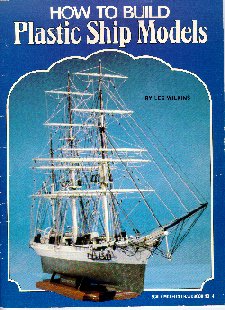|
|
| Tell me when this page is updated |
|
|
| Tell me when this page is updated |
|
|
How to Build Plastic Ship Models
by Les Wilkins, Kalmbach Books, Waukesha, Wisconsin, USA, 1980 Review by Felix Bustelo
 Chapter 1 serves as an introduction to ship modeling and is an overview of tools and supplies as well as some concepts. Covered in this chapter are tools, adhesives, fillers, paints, airbrushing and brush painting and how to conduct research on your subject. Chapter 2 actual delves into building sailing ship models, looking at basic as well as more advanced techniques and tips. The chapter covers mating, gluing and filling hull halves; gluing and detailing decks; gluing and detailing cabins, deckhouses, ship's boats and guns; assembling masts and yards, including attaching footropes; and how to paint the ship model. The technique on how to detail "wood" decks, which brings out the wood grain scribed onto the deck, is excellent and it works. Chapter 3 covers in depth rigging your ship model. It covers standing and running rigging, ratlines and shrouds and attaching sails (plastic or cloth) to the yards. The chapter outlines a simple method to make your own ratlines from nylon thread if you want to replace the hard molded ones that come with some kits. Chapter 4 is a step-by-step discussion on how to build a plastic ship model where the author ties in the tips and techniques from the previous chapters. The project covered by Chapter 4 is a conversion of the Revell 1/96 scale USS Constitution to her sister-ship, the USS President. It is an excellent way to summarize the book's lessons. Chapter 5 covers building steel ships and it is not the book's strong point. While useful as a basic guide, the book was published prior to the availability of photo-etched accessories that are now available. So, ship modelers looking for instructions and tips to how to work with photo-etching will be very disappointed. The book concludes with an appendix covering flags and the proper placement of these on ships. I personally found this appendix did not cover the topic as well as it did others and I still have questions regarding the proper placement of flags. Overall, How to Build Plastic Ship Models is an excellent book if you are new to the hobby and you wish to build models of sailing ships. When I purchased it, I was getting reacquainted with ship modeling and I found it very useful and I still refer to it when I build a sailing ship. Return to Book Reviews |